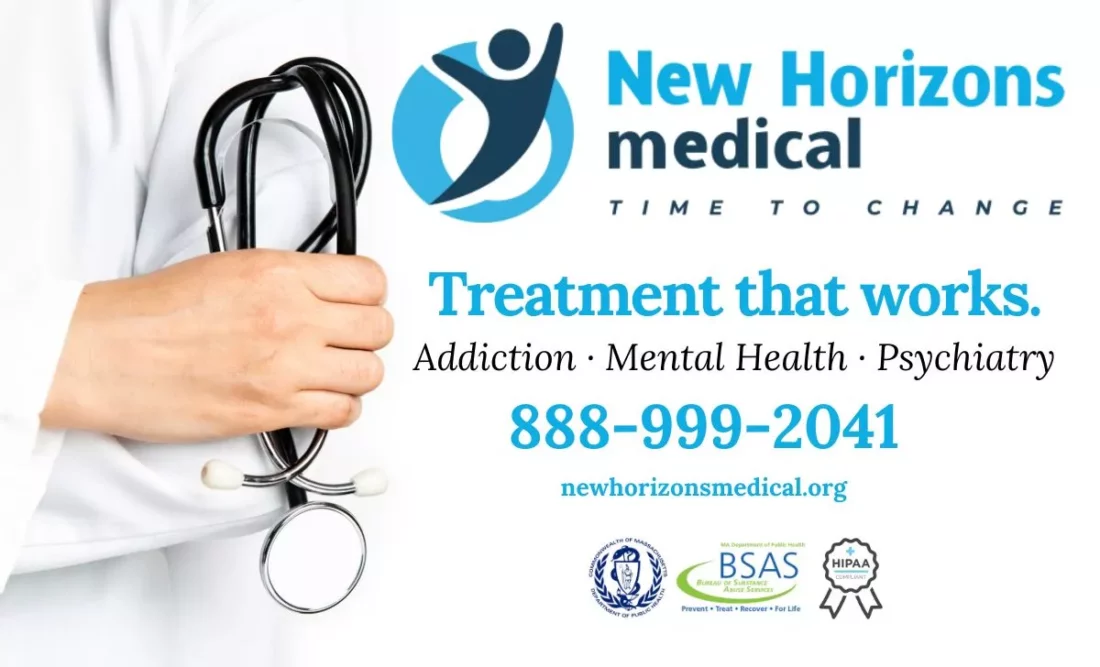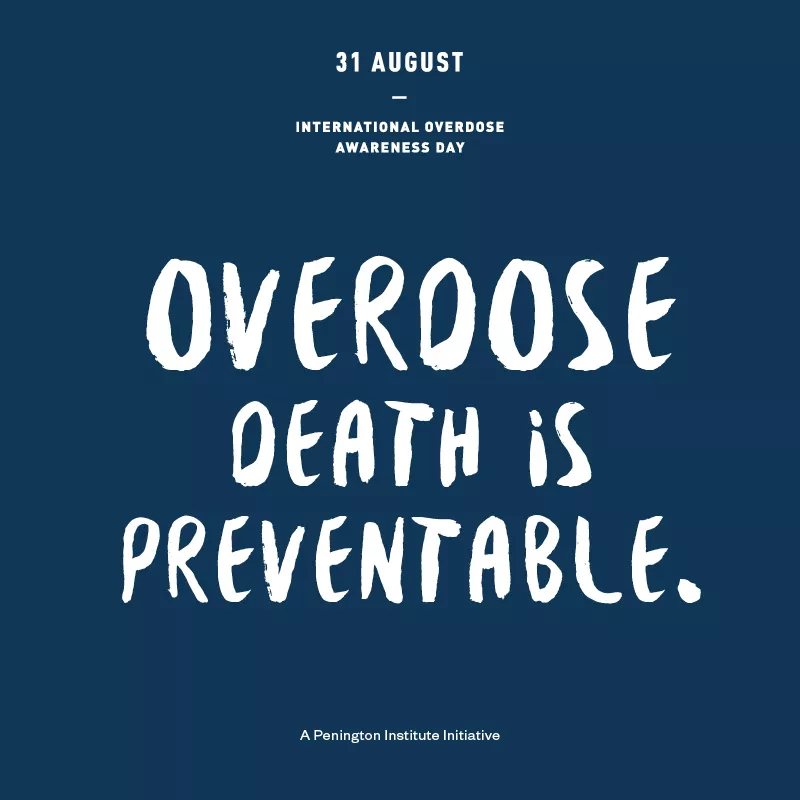
An overdose occurs when an individual consumes a larger amount of a substance than their body can handle whether it’s illicit drugs, prescribed medications, or alcohol. Excessive substance intake can overwhelm the body’s systems and lead to severe health complications or even death. Let’s learn what is an overdose, what to do when it happens, and how to prevent an overdose. See the bottom of the page for downloadable materials.
Overdose statistics
The statistic behind drug and alcohol overdoses is never full… unfortunately, many of the overdose events go unnoticed. But there is a way each of us can help to reduce it.
Below images were sourced from Massachusetts Department of Public Health on Opioid-Related Overdose Deaths among Massachusetts Residents report.
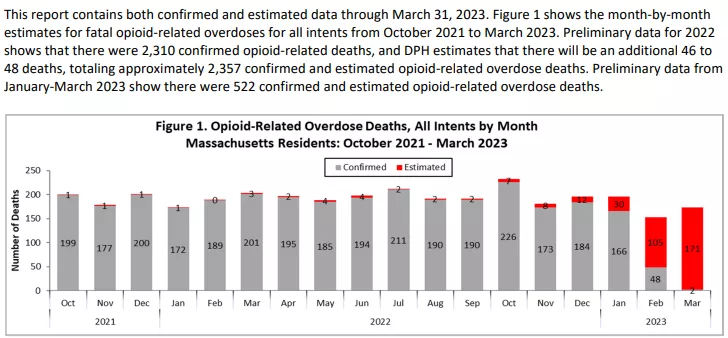
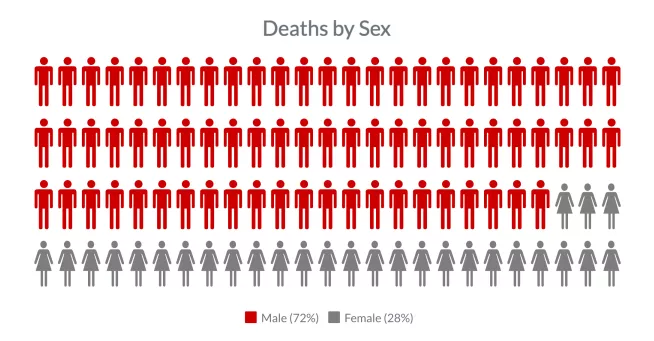
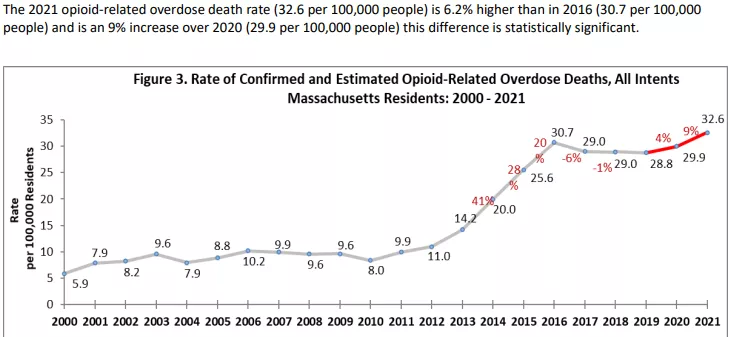
The statistics show a continuously high number of opioid overdose-related deaths in Massachusetts; with men attributing to more than 2/3. This ratio could be because of the stigma associated with mental health care amongst men. Nonetheless the biological gender, all of the humans need support and care.
Don’t go on discussing what a good person should be. Just be one.
Marcus Aurelius
How to prevent an overdose
Preventing an overdose involves being aware of the substances being consumed, knowing the proper dosages, and recognizing signs of potential overdose.
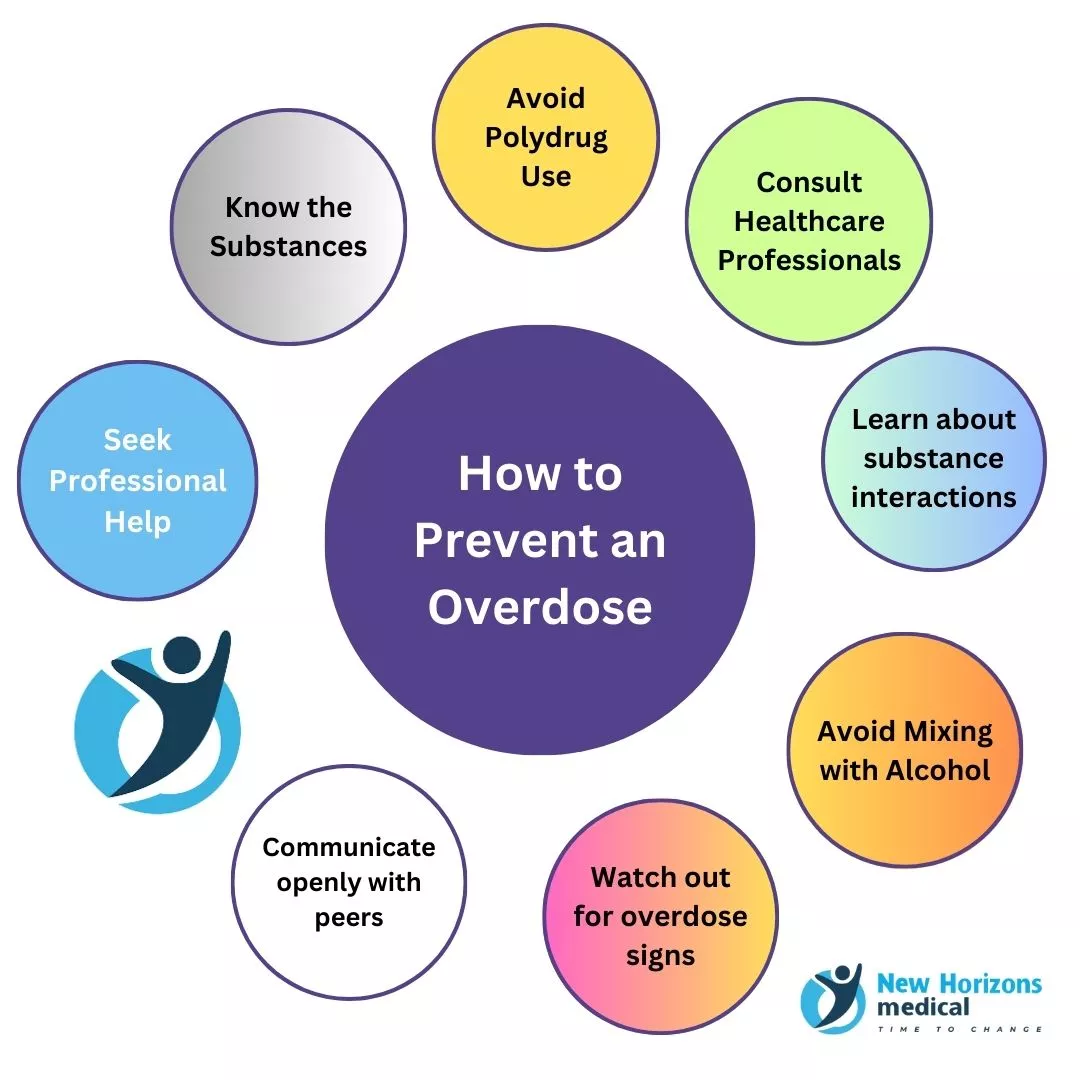
Know the substances
Educate yourself about the effects and potential dangers of the substances you’re using. Whether it’s prescription medications, illicit drugs, or alcohol, understanding their effects on the body, recommended dosages, and possible interactions is crucial.
Avoid polydrug use
Mixing multiple substances, such as alcohol, prescription drugs, or illicit substances, can create a dangerous cocktail that amplifies the risks of overdose. Different substances can have synergistic effects that intensify their impact on the body, potentially leading to life-threatening situations.
Consult healthcare professionals
If you’re taking prescription medications, consult your healthcare provider before taking any other substances, including over-the-counter medications and herbal supplements. Some combinations can have adverse effects, and your doctor can advise you on potential interactions.
Use medications as directed
Always follow the prescribed dosages for medications. Using more than prescribed, whether it’s a prescription drug or an over-the-counter medication, can increase the risk of overdose. This applies to painkillers, sedatives, stimulants, and other medications.
Learn about substance interactions
Research and stay up-to-date on any potential interactions between substances. Some combinations can lead to unpredictable reactions or enhance the side effects of each substance, increasing the risk of overdose.
Avoid mixing with alcohol
Alcohol is a depressant that can amplify the effects of other substances. Mixing alcohol with prescription drugs, painkillers, or illicit substances can lead to dangerous respiratory depression, increasing the risk of overdose.
Watch for warning signs
Be aware of signs of overdose, such as confusion, extreme drowsiness, difficulty breathing, erratic behavior, or loss of consciousness. If you or someone you’re with displays these symptoms, seek medical attention immediately.
Communicate openly with peers
If you’re in a social setting where substances are being consumed, communicate openly with friends or peers about the substances you’re using. This can help prevent accidentally mixing substances or taking a larger dose than intended.
Seek professional help
If you’re struggling with substance use, consider seeking help from healthcare professionals, addiction specialists, or mental health counselors. They can provide guidance, support, and treatment options tailored to your needs.
Medication Assisted Treatments
Therapy
- Psychotherapy
- Substance use Evaluation
- Mental health evaluation
- Individual therapy
- Family education
- Dialectical behavior therapy
- Cognitive behavior therapy
- Addiction therapy & more!
Psychiatry
- Evaluation and office-based treatment
- Medication management

Preventing an overdose involves being proactive, informed, and cautious about the substances you’re consuming. If you’re unsure about potential interactions or concerned about your substance use, don’t hesitate to seek advice from healthcare professionals who can help you make safe and informed choices. Call New Horizons Medical now!
What to Do in an Event of an Overdose
If you suspect someone is experiencing an overdose, the first step is to ensure their safety by placing them in the recovery position, which helps keep their airway clear. Immediately call 911 or emergency services for professional medical assistance. It’s crucial to act quickly to increase the chances of a positive outcome.
1. Observe for Overdose Signs
Check for unresponsiveness using both verbal cues (“I have Narcan”) and physical stimulation (apply firm pressure through a sternal rub on the chest with your knuckles).
- Unresponsiveness or unconsciousness.
- Slowed or stopped breathing.
- Snoring or rattling sounds.
- Cold or clammy skin.
- Discolored lips or fingernails.
2. Call for Immediate Assistance
Dial 911, mentioning “unconscious person” or “possible overdose.”
3. Administer Naloxone
- After confirming an overdose and calling for help, take these steps:
- Administer naloxone by inserting the tip into one nostril.
- Dispense the entire dose using the pump.
- If feasible, perform rescue or supported breathing.
- If no response, repeat naloxone doses every 3 minutes, alternating nostrils.
- If the person resumes breathing adequately, place them in the “recovery position” while awaiting assistance.
Discover where to acquire Naloxone at no cost.
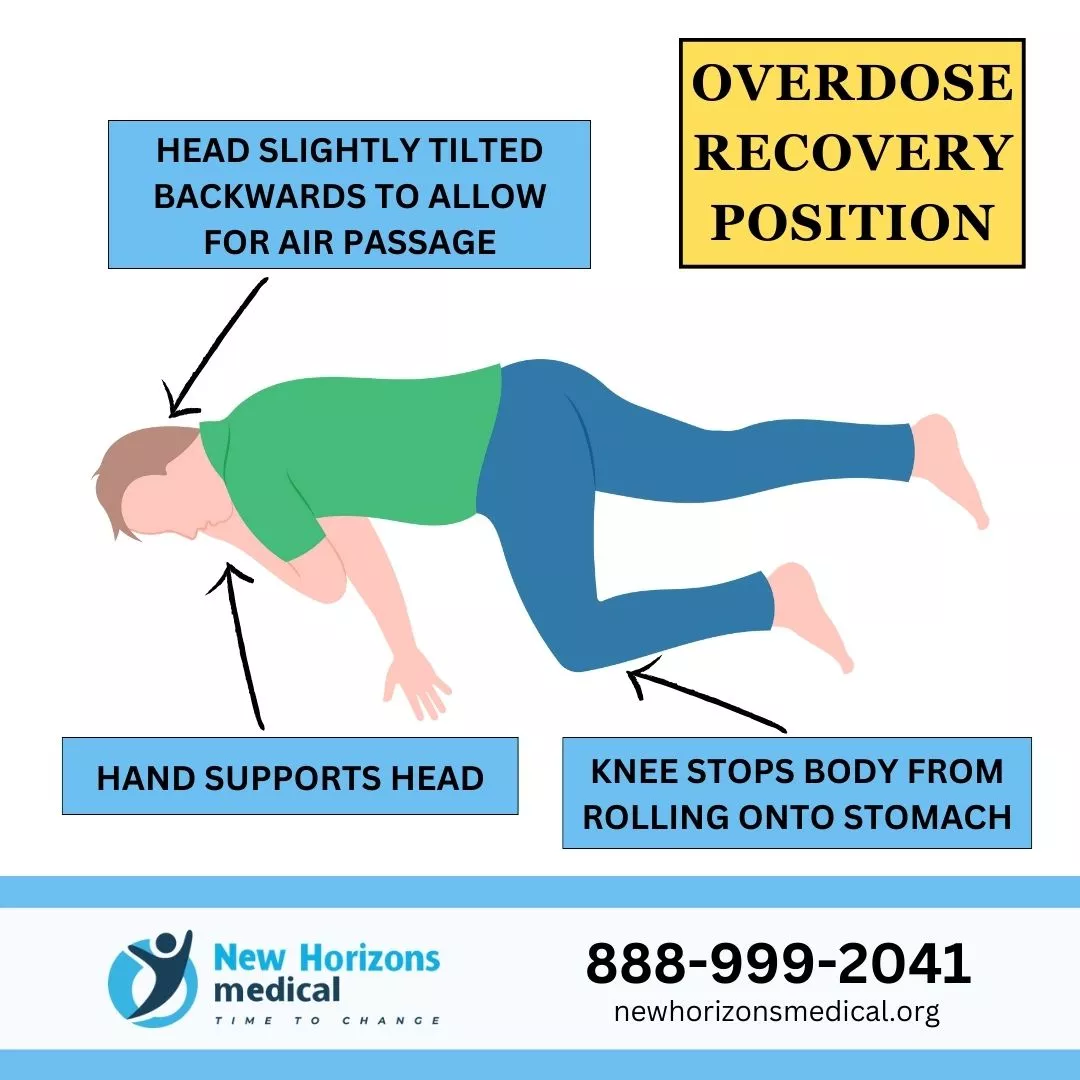
4. Provide Rescue Breaths
- Ensure a clear mouth.
- Tilt the head back, elevate the chin, pinch the nose.
- Deliver one breath every 5 seconds, with visible chest rise and fall.
Special consideration during the COVID-19 pandemic:
- Opt for bag-valve masks (BVMs) with viral filters to aid breathing during COVID-19.
- If untrained in BVM use, perform chest compressions instead of rescue breaths.
- Prior to starting rescue breaths or chest compressions, don a mask.
- An N95 mask is preferable if available.
- If the individual wears a mask, remove theirs AFTER wearing yours, then commence rescue breaths or chest compressions.
5. Remain Until Help Arrives
- Repeat Steps 3 and 4 until professional assistance arrives.
- If breathing improves, place the person in the recovery position (as described below).
- Stay until help comes, even if they appear better. (The Good Samaritan Law safeguards those seeking help during an overdose from legal repercussions related to drug possession.)
- If personal safety necessitates departure, before leaving:
- Administer naloxone.
- Perform rescue breaths (if time allows).
- Position them in the recovery position.
Source: Mass.Gov
What to Do After an Overdose
After an overdose, seeking medical attention is paramount. Speak to a doctor to address any health concerns and receive proper guidance. Engage in an open conversation with your healthcare provider about your substance use history and explore treatment options. Consider enrolling in a substance use clinic like New Horizons Medical to receive specialized care. Additionally, talking to a mental health professional can help address underlying psychological factors that contribute to substance misuse, supporting long-term recovery and overall well-being.
Turning point
A turning point is that pivotal moment when someone grappling with addiction recognizes the need for change and commits to a path of recovery. It’s when the individual starts to see the toll that substance abuse has taken on their life, relationships, and well-being. This realization often comes with a strong desire to break free from the cycle of addiction, leading to a profound shift in mindset. It’s a moment of clarity and courage, where they decide to confront their challenges, seek help, and work towards rebuilding their life. If you or a loved one is at this stage it is VERY important to keep the courage alive – keep supporting the recovery endeavor and encourage for continuation.
Need someone to help? New Horizons Medical counseling team is here for you!
What triggers a turning point?
For many addicts, the moment of clarity often arrives during a significant life event or rock-bottom experience. It might be a near-death overdose, the loss of a loved one due to their addiction, or a realization that they’re harming themselves and those around them. This pivotal moment serves as a wake-up call, making them question the path they’re on. With introspection and newfound determination, they embark on a journey towards healthier living and personal restoration. Recognizing that change is essential, they seek professional help, join support groups, and embrace treatment programs that enable them to reclaim their identity, relationships, and aspirations.
An overdose or near-death experience is undeniably a wake-up call, but it doesn’t have to be the sole catalyst for change.
The turning point can be triggered by various factors, such as a growing desire for a healthier lifestyle, support from loved ones, personal realization of the negative impact of addiction, or even exposure to inspiring success stories of recovery. While a near-death experience can be a powerful motivator, the path to recovery can also be initiated by recognizing the value of life, seeking personal growth, and acknowledging the possibility of a fulfilling future beyond addiction.

How to Support People in Overdose Recovery
People are social creatures and rely heavily (even unknowingly) on the support of others, sometimes limited to simple interactions. Here is how everyone can chip in to make it a better world and help prevent irreversible events:
Regular Check-Ins
Reach out to friends, family, or loved ones regularly to check in on their well-being. A simple text, call, or in-person conversation can provide an opportunity for them to share their feelings and experiences.
Offer Support
Let others know that you’re there to support them, no matter what challenges they’re facing. This can create a sense of safety and comfort, making it easier for them to reach out if they need help.
Empathy and Understanding
Approach conversations with empathy and a non-judgmental attitude. Try to understand the underlying reasons behind someone’s substance use, which can help build trust and encourage them to seek help if needed.
Respect Boundaries
Everyone has their own comfort zones and boundaries. Respect their space, opinions, and decisions. Being understanding of their boundaries shows that you value their autonomy.
Celebrate Their Success
Be genuinely happy for your people’s achievements and milestones. Celebrating their successes and being their cheerleader can strengthen your bond and make them feel supported. If they share = they need your support.
Stay Connected
Continue to stay connected even if someone is facing challenges. Knowing that they have a support network can make a significant difference in their recovery journey.
Overdose Awareness Day Events
There will be multiple Overdose Awareness Day events annually on August 31st, check for a local one to attend. In 2023, New Horizons Medical will be in Boston, Framingham, and Haverhill!
Need help managing a substance addiction?
Our team of licensed professionals can help you! We work with most health insurance plans in Massachusetts including MassHealth and Medicare and have new patient openings for mental health counseling.
